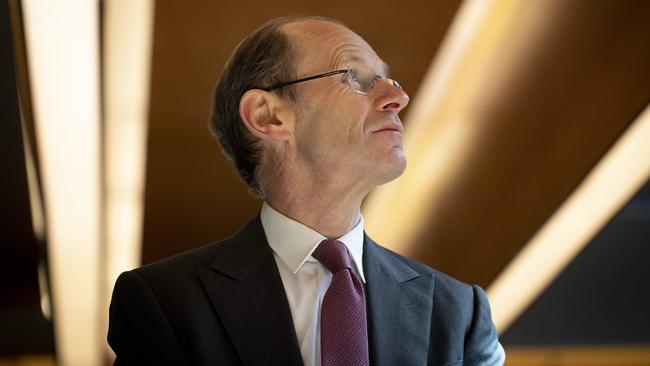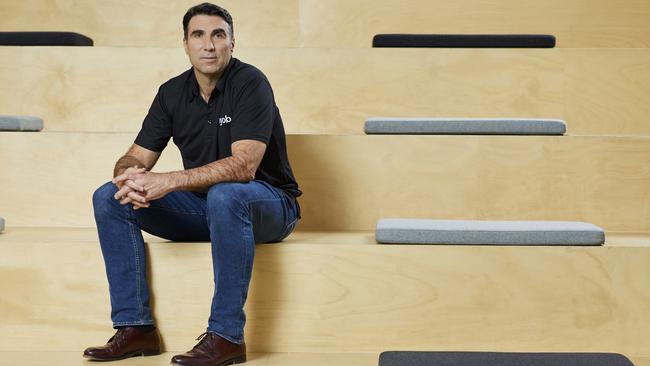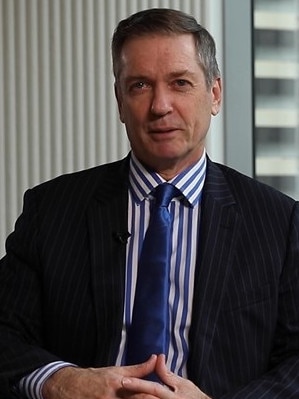ANZ’s big tech reinvention goes beyond banking
In carving out new ground against bigger rivals, ANZ boss Shayne Elliott is forcing his top executives to think outside the banking box.

QLD Business
Don't miss out on the headlines from QLD Business. Followed categories will be added to My News.
When ANZ boss Shayne Elliott in May talked about splitting his Melbourne-based lender into two to give him options on technology investments, he was pushing his management team to think outside the box for banking services.
Fast-forward two months and ANZ is in talks with private equity giant KKR about a toppish $4bn buyout of accounting software business MYOB.
While the two parties are close, there is no guarantee a transaction will happen. But it is enough to give investors an insight into what type of deals can be expected as it doubles down in technology spend.
In May, Elliott talked of advancing plans to separate its banking and non-banking operations under a holding company – the aptly titled non-operating holding company structure.
This provides a structure to house investments and businesses that are outside the core businesses of deposits and writing loans.
Elliott recently told The Australian that ANZ was looking at digital services to help with the overall “financial well being” of customers. But not all of these services need to carry the heavy regulation of a bank which makes them ideal for the non-operating model.
“As we reconsider our future business model and what we want to be able to do with customers and increase the services, you want to be able to provide them,” Elliott said at his interim results in May.

MYOB is two steps away from the core business of banking but Elliott sees it as a potential inroad into more than 630,000 small and medium-sized business customers, which is where the new battleground of banking is being fought.
It continues the push for ANZ to think about non-banking moves in a bid to stake out new market share. Elliott sees tech players like Apple and Google making inroads into quasi banking services, while others like Jack Dorsey’s Block payments system is attempting to use Afterpay to expand its reach with merchants.
In mid-2017 ANZ held talks to become a cornerstone investor in the Domain Group property listings business. This was prior to Domain being partially spun out on the ASX by then owner Fairfax Media.
While those talks didn’t end up going anywhere the idea was the same: acquire an adjunct business as a way to boost product distribution – in that case it was home loans.
MYOB was acquired off the ASX in 2019 for $2bn, and at the time it was generating annualised earnings of $190m from revenue of $450m. This implied a profit margin in excess of 40 per cent and more than 90 per cent of the revenue was recurring. As well as the core accounting software, before the acquisition it was building up a payments business which included direct payments, payments gateway and merchant facilities which competed on ANZ’s ground.
At the heart of any deal ANZ sees an opportunity for MYOB to help it plug directly into businesses to offer areas such as automated cash flow lending or invoice payments, which could see automated loan approvals.

This would give it an edge against small to mid-sized business banking leader NAB, while CBA is also making serious inroads in this space.
Shortly after its acquisition KKR installed well-regarded former REA Group chief Greg Ellis as the boss to push ahead with tech investment. As in most private equity exits, Ellis would have a large stake in the sale of the business and would be unlikely to remain in the longer term.
ANZ, which is attempting to play catch-up with technology, will be well aware that in banking acquisitions the integration risk is enormous. And this becomes even more acute when banks become owners of fintech businesses. Here innovation often falls victim to endless process meetings and the (rightly) deeply conservative management mindset of banking usually goes against the culture of technology workers.
CBA, the nation’s biggest bank, appears to be getting the balance right with its x15ventures arm, where the relationship operates at arm’s length and is more like one between a venture capital investor and a start-up. CBA gives x15 the funding and a problem and it is up to the tech specialists to go away and find a solution in order to reach the next funding round.
Moore’s Law
Veteran value investor Paul Moore has cautioned against groupthink in financial markets.
He points out the sell-off in markets since the end of last year means valuations are remarkably cheap, particularly when it comes to European shares.
Moore, a BT Funds alumni, points out that just 12 months ago the central narrative in markets was that interest rates would be lower for longer. Then the argument was that inflation was transitory and now some central bankers have cautioned that inflation could be higher for longer.

“It highlights why one should always be cynical of the so-called experts’ forecast. When we all think alike, no one thinks very much,” says Moore, who oversees nearly $600m in funds.
Moore was speaking as his Australian companies fund delivered a return of 10.6 per cent in the face of a brutal year, sharply outperforming the ASX 200 index, which returned minus 6.5 per cent. Moore’s global fund returned minus 0.9 per cent for the year, also outperforming a minus 6 per cent-plus fall in the MSCI benchmark.

Locally, Moore has recently picked up unloved casino player Star Entertainment, which is battling fallout from governance failures. Elsewhere his fund continues to back banks ANZ, NAB and Westpac, which will deliver 10 per cent-plus returns.
Moore says the changing tide on rates “has certainly impacted markets” and irrational-priced growth stocks as rates changed morphed into a significant market panic.
Moore says that even with inflation hitting double digits in Europe, the European Central Bank has yet to start its rate hike cycle. Share valuations have already fallen, but money markets are tempering expectations of how much the ECB will have to raise rates.
“We have seen a remarkably short post-Covid 19 trough-to-peak economic cycle and now back to concerns over a recession,” Moore says.
“It would not surprise me if this was followed by an even shorter peak-to-trough cycle, which is what makes current valuations and record lows sentiment quite interesting.”
In addition interest rates at current levels should not be an issue.
“It’s more the spirit of the adjustment that has caused the market some angst, and probably the most important point – the economy behaves differently in an inflationary environment. So be wary of making assessments based on past experience that was framed within a deflationary environment.”
Moore says he continues to focus on value in the market over the long term. Through 20-plus years in the market Moore has stuck to the basic rule: buy bottom quartile valuations and sell at the top.
More Coverage
Originally published as ANZ’s big tech reinvention goes beyond banking





